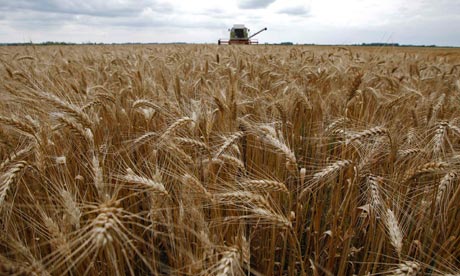
Wheat prices are at a two year high
The soaring price of wheat has raised questions about the UK’s commitment to biofuels as it attempts to wean itself from its dependence on oil.
A network of biorefineries that convert wheat and other crops into bioethanol that can then be blended with petrol are being developed as the UK looks to meet its EU renewable transport fuels obligations.
But the huge amounts of wheat that will be used in the process – up to a fifth of the UK’s current annual production within four years – have prompted questions about where the crop will come from.
[ad]
At the end of a week in which the wheat price hit a two-year high as Russia, the world’s fourth largest producer, imposed an export ban for the second year running, there were fears that the domestic move to biofuels would lead to further rises in the cost of wheat. The result would be a significant rise in shopping bills.
Currently there is only one wheat biorefinery operating in the UK. Owned by a company called Ensus, the Tees-side plant, which cost almost £300m to build and was temporarily closed due to teething problems, will use some 1.2m tonnes of wheat a year when at full capacity.
But four more plants that could use wheat, at Immingham, Corby, Grimsby and Hull, are also in development. According to the cereals and oilseeds division of the Agriculture and Horticulture Development Board, the three UK biofuel refineries that are expected to be fully operating by 2014 will require 3m tonnes, one-fifth of the wheat produced in the UK.
The demand is expected to rise further as the UK tries to meet recently agreed EU biofuel targets. The UK has recently signed up to a compulsory EU target that will see 10% of its transport fuels come from renewable sources by the year 2020.
The “dash for wheat” could see large amounts of land converted to arable use both in the UK and abroad. Green groups are concerned about what this will mean for developing countries.
The World Bank, the OECD and the UK government’s Gallagher report all identified biofuels as a significant factor in recent food price rises. But some reports suggest biofuels could actually help to “smooth out” the peaks and troughs associated with the wheat market by providing producers with more stable demand.
Concerns about the UK’s wheat supply come at the end of a week in which the UN Food and Agriculture Organisation warned that world food prices have risen to their highest level in two years. It said that the increase was due partly to a drought in Russia, where government export restrictions have led the price to surge. Speculators have also been blamed for helping to drive prices higher at a time of general uncertainty.
A spike in food prices triggered deadly riots in Mozambique last week and experts worry that other countries that saw such unrest during the last global food crisis in 2008 could be hit again. In Egypt, where half of the population depends on subsidised bread, recent protests over rising prices left at least one person dead. There are also reports of price increases in flood-hit Pakistan.
Kenneth Richter, head of biofuels at Friends of the Earth, said last week’s riots showed that food should not be used for fuel. “In a time of rising food prices and global shortages, it is cynical to burn wheat in our cars,” he said.
Source Guardian

